Diary of Anais Nin, Volume 1 Read online
Page 2
Behind the windows of the village houses old women sit watching people passing by. The street runs down unevenly towards the Seine. By the Seine there is a tavern and a restaurant. On Sundays people come from Paris and have lunch and take the rowboats down the Seine as Maupassant loved to do.
The dogs bark at night. The garden smells of honeysuckle in the summer, of wet leaves in the winter. One hears the whistle of the small train from and to Paris. It is a train which looks ancient, as if it were still carrying the personages of Proust's novels to dine in the country.
My house is two hundred years old. It has walls a yard thick, a big garden, a very large green iron gate for cars, flanked by a small green gate for people. The big garden is in the back of the house. In the front there is a gravel driveway, and a pool which is now filled with dirt and planted with ivy. The fountain emerges like the headstone of a tomb. The bell people pull sounds like a giant cowbell. It shakes and echoes a long time after it has been pulled. When it rings, the Spanish maid, Emilia, swings open the large gate and the cars drive up the gravel path, making a crackling sound.
There are eleven windows showing between the wooden trellis covered with ivy. One shutter in the middle was put there for symmetry only, but I often dream about this mysterious room which does not exist behind the closed shutter.
Behind the house lies a vast wild tangled garden. I never liked formal gardens. At the very back is a wooded section with a small brook, a small bridge, overrun with ivy and moss and ferns.
The day begins always with the sound of gravel crushed by the car.
The shutters are pushed open by Emilia, and the day admitted.
With the first crushing of the gravel under wheels comes the barking of the police dog, Banquo, and the carillon of the church bells.
When I look at the large green iron gate from my window it takes on the air of a prison gate. An unjust feeling, since I know I can leave the place whenever I want to, and since I know that human beings place upon an object, or a person, this responsibility of being the obstacle when the obstacle lies always within one's self.
In spite of this knowledge I often stand at the window staring at the large closed iron gate, as if hoping to obtain from this contemplation a reflection of my inner obstacles to a full, open life.
No amount of oil can subdue its rheumatic creaks, for it takes a historical pride in its two-hundred-year-old rust.
But the little gate, with its overhanging ivy like disordered hair over a running child's forehead, has a sleepy and sly air, an air of being always half open.
I chose the house for many reasons.
Because it seemed to have sprouted out of the earth like a tree, so deeply grooved it was within the old garden. It had no cellar and the rooms rested right on the ground. Below the rug, I felt, was the earth. I could take root here, feel at one with the house and garden, take nourishment from them like the plants.
The first thing I did was to have the basin and fountain unearthed and restored. Then it seemed to me that the house came alive. The fountain was gay and sprightly.
I had a sense of preparation for a love to come. Like the extension of canopies, the unrolling of ceremonial carpets, as if I must first create a marvelous world in which to house it, in which to receive adequately this guest of honor.
It is in this mood of preparation that I pass through the house, painting a wall through which stains of humidity show, hanging a lamp where it will throw Balinese shadow plays, draping a bed, placing logs in the fireplace.
Every room is painted a different color. As if there were one room for every separate mood: lacquer red for vehemence, pale turquoise for reveries, peach color for gentleness, green for repose, grey for work at the typewriter.
Ordinary life does not interest me. I seek only the high moments. I am in accord with the surrealists, searching for the marvelous.
I want to be a writer who reminds others that these moments exist; I want to prove that there is infinite space, infinite meaning, infinite dimension.
But I am not always in what I call a state of grace. I have days of illuminations and fevers. I have days when the music in my head stops. Then I mend socks, prune trees, can fruits, polish furniture. But while I am doing this I feel I am not living.
Unlike Madame Bovary, I am not going to take poison. I am not sure that being a writer will help me escape from Louveciennes. I have finished my book D. H. Lawrence: An Unprofessional Study. I wrote it in sixteen days. I had to go to Paris to present it to Edward Titus for publication. It will not be published and out by tomorrow, which is what a writer would like when the book is hot out of the oven, when it is alive within one's self. He gave it to his assistant to revise.
As soon as I go to Paris too often, my mother looks disapprovingly out of her window, and does not wave good-bye. She looks, at times, like the old women who raise their curtains to stare at me when I take Banquo for a walk. My brother Joaquin plays the piano continuously, as if he would melt the walls of the house.
I take walks along the railroad tracks on bad days. But as I have never been able to read a timetable, I never walk here at the right time and I get tired before the train comes to deliver me from the difficulties of living, and I walk back home. Does this fascination for a possible accident come from the traumatic time when I missed such a death as a child? We had a servant in Neuilly (when I was two years old, and my brother Thorvald just born). My father must have seduced her and then forgotten her. Anyway, she sought revenge. She took my brother and me on an outing and left the carriage, and me beside it, in the middle of the railroad track. But the signal gateman saw us, and as he had seven children of his own, he took a chance on his own life and rushed out in time to kick the carriage out of the way and carry me off in his arms. The event remained in our memory. I still remember the beds covered with toys for the seven children of the man who saved our lives.
Richard Osborn is a lawyer. He had to be consulted on the copyrights of my D. H. Lawrence book. He is trying to be both a Bohemian and a lawyer for a big firm. He likes to leave his office with money in his pocket and go to Montparnasse. He pays for everyone's dinner and drinks. When he is drunk he talks about the novel he is going to write. He gets very little sleep and often arrives at his office the next morning with stains and wrinkles on his suit. As if to detract attention from such details, he talks more volubly and brilliantly than ever, giving his listeners no time to interrupt or respond, so that everyone is saying, "Richard is losing his clients. He cannot stop talking." He acts like a man on a trapeze who must not look down at the public. If he looks below he will fall. He will fall somewhere between his lawyer's office and Montparnasse. No one will know where to look for him for he hides his two faces from all. There are times when he is still asleep in some unknown hotel with an unknown woman when he should be at his office, and other times when he is working late at his office, while his friends are waiting for him at the Café du Dôme.
He has two recurrent monologues. One is patterned after a trial for plagiarism. It seems that a great many people have copied his novels, his plays, and his ideas. He is preparing a long brief to sue them. "They" always steal his briefcase. One of the novels stolen from him is now published, and one of his plays is being acted on Broadway. That is why he does not show his present novel to me or to anyone.
His other monologue concerns his friend Henry Miller. Henry Miller is writing a book one thousand pages long which has everything in it that is left out of other novels. He has now taken refuge in Richard's hotel room. "Every morning when I leave he is still asleep. I leave ten francs on the table, and when I return there is another batch of writing done."
A few days ago he brought me an article by Henry Miller on Buñuel's film L'ge d'Or. It was as potent as a bomb. It reminded me of D. H. Lawrence's "I am a human bomb."
There is in this piece of writing a primitive, savage quality. By contrast with the writers I have been reading, it seems like a jungle. Only a short article, bu
t the words are slung like hatchets, explode with hatred, and it was like hearing wild drums in the midst of the Tuileries gardens.
You live like this, sheltered, in a delicate world, and you believe you are living. Then you read a book (Lady Chatterley, for instance), or you take a trip, or you talk with Richard, and you discover that you are not living, that you are hibernating. The symptoms of hibernating are easily detectable: first, restlessness. The second symptom (when hibernating becomes dangerous and might degenerate into death): absence of pleasure. That is all. It appears like an innocuous illness. Monotony, boredom, death. Millions live like this (or die like this) without knowing it. They work in offices. They drive a car. They picnic with their families. They raise children. And then some shock treatment takes place, a person, a book, a song, and it awakens them and saves them from death.
Some never awaken. They are like the people who go to sleep in the snow and never awaken. But I am not in danger because my home, my garden, my beautiful life do not lull me. I am aware of being in a beautiful prison, from which I can only escape by writing. So I have written a book about D. H. Lawrence out of gratitude, because it was he who awakened me. I took it to Richard and he prepared the contracts, and then he talked about his friend Henry Miller. He had shown my manuscript to Henry Miller and Miller had said, "I have never read such strong truths told with such delicacy."
"I would like to bring him to dinner," said Richard. And I said yes.
So delicacy and violence are about to meet and challenge each other.
The image this brings to my mind is an alchemist workshop. Beautiful crystal bottles communicating with each other by a system of fragile crystal canals. These transparent bottles show nothing but jeweled, colored liquids or clouded water or smoke, giving to the external eye an abstract aesthetic pleasure. The consciousness of danger, fatal mixtures, is known only to the chemist.
I feel like a well-appointed laboratory of the soul—myself, my home, my life—in which none of the vitally fecund or destructive, explosive experiments has yet begun. I like the shape of the bottles, the colors of the chemicals. I collect bottles, and the more they look like alchemist bottles the more I like them for their eloquent forms.
When I saw Henry Miller walking towards the door where I stood waiting, I closed my eyes for an instant to see him by some other inner eye. He was warm, joyous, relaxed, natural.
He would have passed anonymously through a crowd. He was slender, lean, not tall. He looked like a Buddhist monk, a rosy-skinned monk, with his partly bald head aureoled by lively silver hair, his full sensuous mouth. His blue eyes are cool and observant, but his mouth is emotional and vulnerable. His laughter is contagious and his voice caressing and warm like a Negro voice.
He was so different from his brutal, violent, vital writing, his caricatures, his Rabelaisian farces, his exaggerations. The smile at the corner of his eyes is almost clownish; the mellow tones of his voice are almost like a purring content. He is a man whom life intoxicates, who has no need of wine, who is floating in a self-created euphoria.
In the middle of a serious discussion between Richard and Joaquin, he began to laugh. Seeing the perplexity on Richard's face, he said, "I'm not laughing at you, Richard, but I just can't help myself. I don't care a bit who's right. I'm too happy. I'm just so happy right at this moment, with all the colors around me, the fire in the fireplace, the good dinner, the wine, the whole moment is so wonderful, so wonderful..." He talked slowly, as if enjoying his own words. He installed himself completely in the present. He appeared gentle and candid. He admitted he had only come because of Richard's promise of a good dinner. But now he wanted to know the whole house, everyone living in it, what each one did, and asked question after question with casual unrelentingness. Henry Miller talked with Joaquin about music, about his compositions and his concerts. He went to shake my mother's hand, he visited the garden, looked over the books. He was full of curiosity. Then, sitting by the fire, he began to talk about himself:
"Last night I spent the night in a cinéma de quartier. I had nowhere else to go. Richard was entertaining his girl. I watched the film three times because the actress reminded me of my wife, June. Then I slipped down into the seat and went to sleep. They never clean up the place until morning and even then the femme de ménage only grunts when she sees me and lets me off. Did you ever stay in a movie house when it's empty? Films are like a dose of opium, then as you come out in the street it's a shock, and you are brutally awakened from your dream. But when you stay, you never wake up. The dream goes on working. I would fall asleep for a while and then see images on the screen, and I could not tell the difference between the film and a dream. I saw my wife, June, as she looked when she announced to me one morning in New York: 'You always wanted to go to Paris and become a writer, well, I have the money. But I can't go with you. I'll follow you later.' The story on the screen was about a woman who lied, she lied, and damn it, she made the lie come true. She wanted to become an actress so she invented that she had a love affair with the best known of all the actors, and publicized it so well, in such heightened colors, that the actor himself came to confront her. Then she explained to him why she had done it, describing at the same time the 'scenes' which had taken place between them, with such charm that he stayed on and fulfilled all she had invented as if it had been a prophecy. My wife, June, can confuse me in this way. She stayed in New York to earn money for my trip. Don't ask me how she earns money. Every time I tried to find out, I ran into such complicated stories, intrigues, miraculous barters, that I gave up trying to understand. Everything she did had that air of prestidigitation. 'You want to go to Paris, Henry? I'll find a way. The rent is due. Let me see the landlord.' She reminded me of the gypsies I saw in the south of France. When they come home, they lift up their skirt and, presto, there's a chicken or two they have stolen. I felt that June's stories were lies, but I could not disprove them. I felt that her bargaining power came not from objects or ingenuity but from giving herself. She would tell me to keep on writing and forget about all this, but I could not write. I spent all my time trying to figure out how she solved these problems without going to work like everybody else. She never answered direct questions. She reminded me of the Arabs who believe that true intelligence consists of concealment of your thoughts. But damn it, you conceal your thoughts from an enemy, not a husband, lover, friend. She always said she concealed her thoughts from me because whatever she did tell me, I would turn around and caricature. But I only do this when I'm angry. If she read a book, sooner or later I would discover it had been given to her by somebody else and that her opinion of the book belonged to the giver. Other times she even told people that it was she who had first made me read Dostoevsky and Proust. I don't know why I am talking in the past tense. She's coming in a few weeks."
The two sides of himself showed simultaneously: acceptance and passivity in life, rebellion and anger at whatever happened to him. He endured, and then must avenge himself, probably in his writing. The writer's delayed reaction.
June is an irritant. He turns away into the uncomplicated worlds he enjoys. "I like the prostitutes. There is no pretense there. They wash themselves in front of you."
Henry is like a mythical animal. His writing is flamboyant, torrential, chaotic, treacherous, and dangerous. "Our age has need of violence."
I enjoy the power of his writing, the ugly, destructive, fearless cathartic strength. This strange mixture of worship of life, enthusiasm, passionate interest in everything, energy, exuberance, laughter, and sudden destructive storms baffles me. Everything is blasted away: hypocrisy, fear, pettiness, falsity. It is an assertion of instinct. He uses the first person, real names; he repudiates order and form and fiction itself. He writes in the uncoordinated way we feel, on various levels at once.
I have always believed in André Breton's freedom, to write as one thinks, in the order and disorder in which one feels and thinks, to follow sensations and absurd correlations of events and images, to
trust to the new realms they lead one into. "The cult of the marvelous." Also the cult of the unconscious leadership, the cult of mystery, the evasion of false logic. The cult of the unconscious as proclaimed by Rimbaud. It is not madness. It is an effort to transcend the rigidities and the patterns made by the rational mind.
Henry has a strange mixture of all these things. He can be swept off his feet easily by a book, a person, an idea. He is a musician and a painter.
He notices everything, the fat-bellied bottles for the wine, the hissing of the damp logs in the fireplace. He selects from everything only what can be enjoyed. He even enjoys Emilia's slightly crossed eyes. She reminds him of figures in Goya paintings. He enjoys the colors on the wall, the oranges and the blues.
He finds joy in everything, in food, in talk, in drink, in the sound of the bell at the gate, the liveliness of Banquo, who comes in slapping the furniture with his tail.
He thinks I must know a great deal about life because I once posed for painters when I was sixteen. The extent of my innocence would be incredible to him. I tried to look up in the dictionary some of the words he uses, but they were not there.
After he left I destroyed my enjoyment, thinking he would not be interested in me, that he had lived too much, too roughly, too completely, like a Dostoevskian character, the lower depths, and he would find me inexperienced. What does it matter what Henry thinks of me. He will know soon enough exactly what I am. He has a caricatural mind. I will see myself in caricature. Why cannot I express the fundamental me? I play roles too. Why should I care? But I do care. I care about everything. Emotionalism and sensibility are my quicksands. I am fascinated with the "toughness" of Henry and June. It is new to me.
It takes great hatred to make caricature and satire.
I have no hatreds. I have compassion. Everything with me is either worship, passion, or else compassion, understanding. I hate rarely. But I respond to Henry's fiery rebellions. His angers. I can't fathom the paradox of his enjoyment and his angers. My rebellions were concealed, inhibited, indirect. His are open revolutions. He laughs at my concern for Emilia's feelings. I did not want her to hear him laughing at her head being out of proportion to her body. I never hate enough to mock, caricature, or even describe what I hate at length. I am more preoccupied with loving. I can't rave as Henry does against conventional novelists. I picked out D. H. Lawrence and devoted myself to him. I don't rave against politics. I ignore it. I elect something I can love and absorb myself in it. I am absorbed by Henry, who is unsure of himself, self-critical, sincere, and carries within him some great force. I am very busy loving. What does he need? Everything. He is almost a hobo. Sleeps anywhere, at a friend's house, a railroad-station waiting room on a bench, in a movie house, in a park. He has hardly any clothes. They are not his own.

 Diary of Anais Nin, Volume 5
Diary of Anais Nin, Volume 5 A Spy in the House of Love
A Spy in the House of Love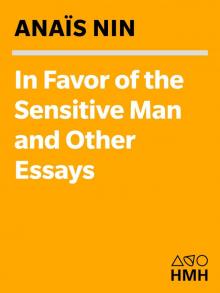 In Favor of the Sensitive Man and Other Essays (Original Harvest Book; Hb333)
In Favor of the Sensitive Man and Other Essays (Original Harvest Book; Hb333)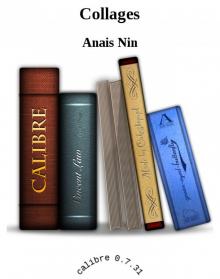 Collages
Collages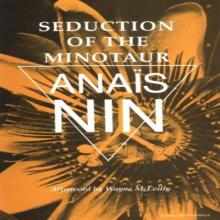 Seduction of the Minotaur
Seduction of the Minotaur Children of the Albatross
Children of the Albatross Delta of Venus
Delta of Venus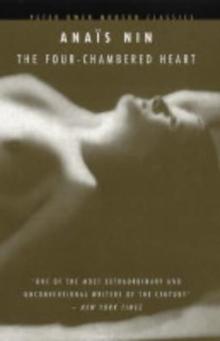 The Four-Chambered Heart coti-3
The Four-Chambered Heart coti-3 Diary of Anais Nin, Volume 2
Diary of Anais Nin, Volume 2 Diary of Anais Nin, Volume 1
Diary of Anais Nin, Volume 1 Diary of Anais Nin, Volume 4
Diary of Anais Nin, Volume 4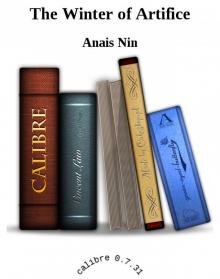 The Winter of Artifice
The Winter of Artifice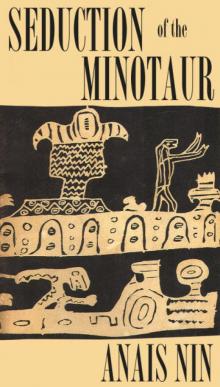 Seduction of the Minotaur coti-5
Seduction of the Minotaur coti-5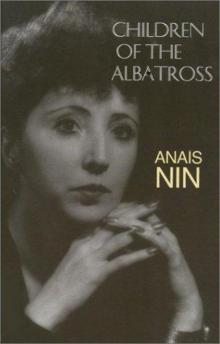 Children of the Albatross coti-2
Children of the Albatross coti-2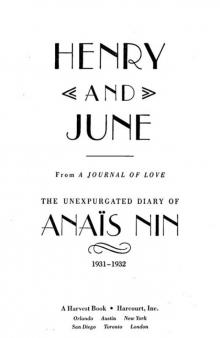 Henry and June: From A Journal of Love -The Unexpurgated Diary of Anaïs Nin (1931-1932)
Henry and June: From A Journal of Love -The Unexpurgated Diary of Anaïs Nin (1931-1932) Ladders to Fire
Ladders to Fire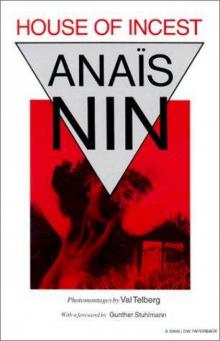 House of Incest
House of Incest